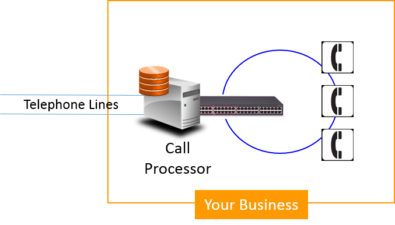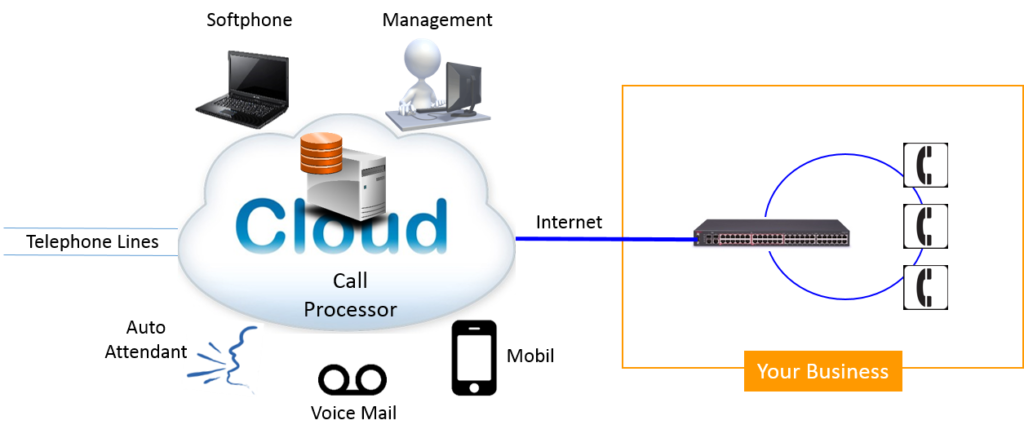What is a Cloud-Based Unified Communication System?
Cloud-based unified communication systems (sometimes called hosted) are the next generation of advanced business communications. UC solutions are changing the way businesses large and small think about how they purchase, manage and maintain their communication systems. The flexibility and scalability of cloud-based systems are providing businesses the opportunity to lower communication costs, increase efficiencies and improve employee productivity.
If you’re new to cloud-based communications read this brief tutorial to learn more and understand the benefits of cloud-based telephone systems.
Two Important Definitions
Cloud-Based: An application or service provided via a centralized network infrastructure available over the Internet. Your Gmail account, QuickBooks or Netflix are examples of cloud-based applications.
Unified Communications (UC): The ability to improve business communications by integrating voice, video, fax, email and mobile devices into a seamless communications solution to lower costs and improve business productivity.
Understanding Cloud-Based UC Systems in Three Steps
Step 1: Traditional Phone Systems

Traditional and VoIP telephones systems have a call processor on-site. The call processor provides telephones with access to the company’s telephone lines and provides all feature functionality for the system. Features like auto attendant, voicemail, call forwarding are all provided via the hardware’s call processor.
Step 2: Cloud-Based Phone Systems

Cloud-based UC systems move the call processing function and telephone lines into the cloud. Telephones located at your business location communicate with the call processor via an Internet connection. The call processor operates in a secure data center which provides a high level of data security, back-up, and resiliency for the system.
Step 3: Cloud-Based Flexibility

Because all call processing takes place in the cloud, cloud-based systems are not susceptible to circumstances that can negatively impact the performance of hardware-based phone systems that locate their call processing functions on-site. Natural disasters, power outages, loss of telephone or Internet connectivity, hardware failures and viruses do not impact the call processing of cloud-based systems. Regardless of what happens at a businesses location call processing and routing continue to take place – cloud-based systems are always on.
The Top Five Benefits of Cloud-Based UC Systems
- High Degree of Reliability: As discussed above, cloud-based call processing takes place in highly secure and redundant data centers, so they are always on. Auto attendant, voice mail, mobile features, and functionality continue to operate regardless of what is happening at the business location. In an emergency or natural disaster call traffic for a business can be managed and re-routed to another location or device.
- Lower Total Cost of Ownership: Unlike hardware-based systems that are designed to serve an individual business, cloud-based resources are shared by thousands of users – lowering the overall cost for each user. Cloud-based systems require no upfront capital. The future cost of maintenance, technical support, training, software, and security upgrades are incorporated into a low monthly fee. Hardware-based systems require annual maintenance agreements, upgrades and “trip charges” that are all expenses paid by the individual business. In addition, hardware-based systems are susceptible to changes in technology and the manufacturers business environment which can render hardware-based systems obsolete.
- Scalability/Flexibility: Cloud-based systems are priced on a per-user basis, making them very scalable. Scalability means you can add or remove users and features as needed. Dissimilar to hardware-based systems which require you to purchase a minimum amount of hardware and software resources regardless of whether you use them or not. Shared resources by cloud-based systems alleviate the call processing constraints associated with hardware-based systems, providing increased management and end-user flexibility. Call processing for multiple locations or devices is not restricted by the hardware or telephone lines associated with an individual business. Cloud-based technology allows for the flexible integration of advanced call processing functionality like voicemail to email, video conferencing, mobile softphone, or CRM software integration.
- Centralize Management: Regardless of the size of your business, or the number of locations system administration is simple, via an intuitive administrative dashboard. System administration can be accessed via the Internet from any desktop or mobile device.
- Secure: Worried about the next software security risk? The centralized nature of UC systems means your phone system is always protected. Cloud system providers maintain and manage the requirements for software security, so you don’t have to. Never worry about software or security upgrades again.
If you would like to learn more about cloud-based UC systems, call us at 800.294.3913.
Small-Medium Solutions ¦ Enterprise Solutions ¦ Education & Government Solutions